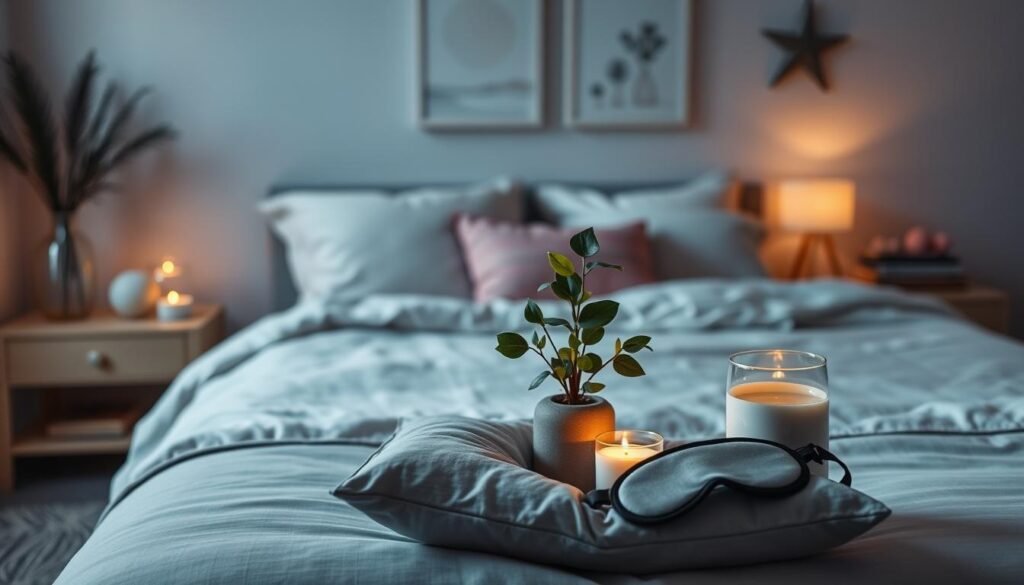Did you know nearly 10% to 15% of adults have chronic insomnia in the US? This condition gets worse for many after surgery. Surgery requires anesthesia, which affects how we sleep. It’s vital to know this while recovering.
Anesthesia often messes with our sleep, particularly in older people. It can lead to sleep problems after surgery. This can slow down recovery and increase the risk of other issues. Explore how anesthesia and insomnia are connected, and how they impact healing after surgery.
This concern focuses on sleep disturbances caused by anesthesia. It’s important for a smoother recovery. We also look at how certain medications can impact sleep during this time. Better sleep hygiene after surgery is essential.
Key Takeaways
- Anesthesia is linked to increased sleep disturbances, particularly in elderly patients after major surgeries.
- Postoperative sleep issues can lead to a higher risk of recovery complications and poor overall health outcomes.
- Pain, environmental factors, and medications play significant roles in insomnia following surgery.
- Improving sleep hygiene can aid in managing insomnia post-surgery.
- Cognitive Behavioral Therapy for Insomnia may be beneficial for those struggling with sleep after surgical procedures.
The Connection Between Anesthesia and Sleep Disturbances
Using anesthesia in surgeries can cause a clear link to sleep problems. About 23% of patients might have sleep issues after their surgery. These problems often show up as insomnia. It’s a common issue after having surgery. The type of anesthesia can also change these outcomes a lot.
People who get general anesthesia often have more sleep problems in the hospital. Their rate is about 22.95%, while it’s only 8.6% for those who get a subarachnoid block. It shows that anesthesia effects on sleep quality are bigger with general anesthesia. This kind interrupts our natural sleep and wake cycle. After leaving the hospital, 13.4% of those who had general anesthesia still had sleep disorders. But only 6.3% of those with regional anesthesia had issues.
The hospital environment can make sleep problems worse. Things like noise, bright lights, and being woken up can harm recovery. Pain is also a big reason for sleep problems since most surgeries hurt. Managing pain well is key to avoid losing sleep after surgery.
To recover well, understanding the link between anesthesia and sleep is vital. Sleep troubles come from anesthesia effects and the body’s response to surgery. Being anxious before and after surgery also makes sleep harder.
Understanding the Mechanism of Anesthesia
The way anesthesia works is complex and has many parts, deeply affecting our sleep. Studies have found that anesthetics tap into the same brain and gene areas involved in sleep, especially NREM sleep. Unlike regular sleep, anesthesia creates a state where usual sleep cycle signs are missing. This makes us wonder how anesthesia changes sleep regulation and might cause sleep problems.
Key areas in the brain, like the hypothalamus and the ventrolateral preoptic nucleus, are vital for sleep control under anesthesia. These brain spots help keep us awake or asleep. Anesthetics work on certain paths in the brain, affecting how cells talk to each other. Drugs like propofol and etomidate make us sleepy by acting on specific sites, whereas agents like nitrous oxide and ketamine work differently, blocking signals that would otherwise keep us awake.
Volatile anesthetics, however, don’t mimic natural sleep perfectly. After anesthesia, people might have more REM sleep than usual, showing a tricky link between being put to sleep by drugs and sleeping normally. Things like an increase in deep sleep or the chance of breathing difficulties with some anesthetics highlight the importance of understanding anesthesia’s effects on sleep at a body level.
Does Anesthesia Cause Insomnia?
Anesthesia and sleep have a complicated link that affects patients after surgery. Studies show that general anesthesia can change sleep patterns. This includes trouble falling asleep and staying asleep at night.
Research Findings on Postoperative Sleep Patterns
Many people have sleep issues after surgery. A study in 2022 found problems mostly in the first six nights. Usually, sleep gets better in about a week. But for some, insomnia lasts longer, even up to a year after surgery. This raises a big question: does anesthesia cause insomnia?
Impact on Different Age Groups
Different factors disrupt sleep in various age groups. Older patients especially struggle with sleep, which gets worse with existing sleep problems. A study in 2020 named pain as the main cause of disturbed sleep. Opioids, like morphine, can also make sleep worse. Older adults often need extra help to overcome insomnia during recovery. Experts suggest watching sleep habits closely and making changes to improve sleep quality.
| Age Group | Common Sleep Issues | Duration of Sleep Disturbances |
|---|---|---|
| Young Adults | Transient insomnia, mild sleep apnea | 1 week to 3 months |
| Middle-aged Adults | Difficulty falling asleep, anxiety-related disturbances | 1 week to 6 months |
| Elderly Adults | Increased risk of long-term insomnia, difficulty maintaining sleep | 1 month to 1 year |
Learning how does anesthesia cause insomnia and the different recovery experiences can help create better sleep strategies for after surgery. This can lead to better overall recovery.
Common Causes of Insomnia After Surgery
Many patients face insomnia after surgery. Various factors contribute to this problem. It helps to know these causes to tackle sleep issues better.
Pain and Discomfort
Pain is a big reason why people don’t sleep well after surgery. About 48% of patients feel discomfort right after their operation. Pain and the body’s response to injury make recovery harder. Even if medicines like opioids help with pain, they can also cause sleep problems. Because of this, patients might face sleep issues that last from a few days to months.
Environmental Factors in a Hospital Setting
Hospitals can make it hard to sleep well, affecting recovery. Noisy rooms, bright lights, and constant check-ups disrupt sleep. Stress and anxiety from being in the hospital add to the problem. This is even more true in intensive care units, where sleep problems are more common. By improving these conditions, healthcare workers can help reduce insomnia and aid recovery.
Looking for more information on improving sleep after surgery? Check out certain behaviors that might enhance sleep quality.
The Role of Inflammation in Postoperative Sleep Issues
After an operation, the body’s response can mess with sleep and healing. Researchers have found that this leads to bad sleep patterns because of more inflammation markers. This not only slows down getting better physically but can upset someone’s feelings and cause issues like being very confused.
Big surgeries can make sleeping even harder than small ones. Operations like removing parts of the stomach hurt sleep stages like REM and deep sleep more. But smaller surgeries like laparoscopic ones can have a lighter effect on inflammation and sleep problems.
How pain is treated is super important too. Painkillers, especially opioids, can make sleeping harder by reducing REM sleep. Things like too much noise or light in hospitals also make it hard to sleep well. Worrying, before or after surgery, adds to the trouble sleeping.
Getting the balance right between managing inflammation and dealing with sleep trouble is key to recovery. By finding ways to lessen inflammation and tackle other factors, we can help people heal better. This approach can truly change how well patients recover after surgery.
Sleep Disorders Related to Anesthesia
Understanding sleep disorders after anesthesia is crucial for patient care. Anesthesia can change how we sleep and wake up. This can lead to problems like disrupted sleep patterns.
These issues often cause trouble starting or staying asleep, which increases insomnia risk.
Effects on Circadian Rhythm
Anesthesia can change our natural sleep cycles, impacting our body clock. This is worrying because it affects hormone regulation, including melatonin. Older adults, who already have less melatonin, may find recovery harder.
Studies indicate that up to 62% of patients who have thoracic surgery face sleep challenges within six months.
Increased Risk of Insomnia and Deprivation
Many patients face a higher chance of insomnia after surgery. Research shows almost half of lung cancer surgery patients suffer from sleep problems after a year. Hospital noises and routines can make this worse.
This lack of sleep can cause issues like confusion, more pain, and slow recovery. It’s vital to tackle sleep disorders early.

Medications and Their Effect on Sleep After Surgery
After surgery, many patients have trouble sleeping. This problem often ties back to pain management drugs and anesthesia. Drugs used for these purposes can majorly impact sleep quality. Specifically, opioids are known to reduce REM sleep and mess with sleep structure.
People who have major surgeries are more likely to experience sleep issues. The causes include pre-existing conditions, anesthesia type, and how severe the surgery was. Pain after surgery and environmental stress can make sleeping even harder. This makes it very important to manage sleep well.
Recovery can be tougher due to medication side effects. Drugs like zolpidem and melatonin might improve sleep. Dexmedetomidine offers a sedative effect without harming sleep like opioids can. But, it’s critical to watch how painkillers affect sleep. If not managed well, sleep problems can lead to delirium, more pain sensitivity, and slower recovery.
| Medication | Primary Use | Effect on Sleep |
|---|---|---|
| Opioids | Pain management | May suppress REM sleep; potential for sleep disturbances |
| Zolpidem | Short-term insomnia treatment | Improves sleep onset; risks of dependency |
| Melatonin | Sleep-wake cycle regulation | Helps regulate sleep patterns; fewer side effects |
| Dexmedetomidine | Sedation | Provides sedation without significant opioid-related effects |
It’s very important to watch how patients react to medications after surgery to help them sleep better. Improving sleep might involve making the sleeping area comfy, setting routines, and maybe trying cognitive-behavioral therapy for insomnia. By knowing about surgery-related sleep drugs, healthcare workers can make plans that help patients get back to normal sleep patterns faster.
Managing Anxiety and Stress Before and After Surgery
Going through surgery can make many people feel really anxious and stressed. This stress isn’t just tough on the mind; it can also make it hard to sleep after surgery. Being proactive about managing this anxiety can make recovery smoother. Taking steps to deal with these feelings can make patients stronger emotionally. It helps them handle the stress that comes with surgery better.
The Importance of Psychological Preparation
Getting mentally ready is key to managing surgery anxiety. Knowing what will happen during surgery can make it less scary. This helps patients feel in control. Learning about the surgery beforehand can decrease anxiety. This doesn’t only help with stress before surgery. It also leads to better sleep before and after the procedure.
Stress Relief Techniques
There are many ways to calm anxiety before surgery. These methods help improve emotional health.
- Cognitive-behavioral strategies: This approach changes negative thoughts into positive ones. It builds better coping skills.
- Mindfulness practices: Being mindful helps people focus on the present. It reduces worry.
- Progressive muscle relaxation: This method relaxes the muscles through tension and release. It helps with stress-related tension.
- Breathing exercises: Deep breathing can help calm the mind and body.
Using these methods can lower anxiety and stress before surgery. This leads to better health during recovery. Patients who use these techniques can handle post-surgery challenges better. They find the recovery journey easier.

Improving Sleep Hygiene After Surgical Procedures
Patients often struggle to sleep well after surgery. It’s vital to follow good sleep hygiene for better recovery. This means creating a sleep-friendly setting and using relaxation techniques.
A cozy bedroom is key. Keep the room dark and cool. Remove anything that might make sleeping hard. In hospitals, noise can disrupt sleep. Wearing earplugs or using a white noise machine can make a big difference.
Having a regular sleep schedule helps too. Try to go to bed and wake up at the same time every day. Doing calm activities before bed, like reading or stretching, can prepare your body for sleep.
Being active during the day is also important. Light exercises can improve your sleep. Using mindfulness or deep breaths can help you relax and sleep better.
The following table shows tips for better sleep after surgery:
| Strategies | Description |
|---|---|
| Maintain a Sleep Schedule | Go to bed and wake up at the same time daily. |
| Create a Relaxing Bedroom | Keep the bedroom dark, cool, and quiet. |
| Use of Earplugs | Block out disruptive noises for better sleep. |
| Engage in Gentle Activities | Incorporate light physical activity during the day. |
| Practice Relaxation Techniques | Implement mindfulness or deep breathing exercises. |
Good sleep habits are crucial for recovery and long-term health. Focusing on these strategies can greatly enhance sleep after surgery.
Non-Pharmacological Treatments for Insomnia
Many people look for ways to handle insomnia after surgery without using drugs. They often turn to cognitive behavioral therapy for insomnia and relaxation techniques. These methods help improve sleep without medication.
Cognitive Behavioral Therapy for Insomnia
Cognitive behavioral therapy for insomnia, or CBT-I, changes thoughts and actions that prevent good sleep. It teaches ways to deal with negative thoughts about sleeping. CBT-I can lead to better sleep habits and quality.
This approach is proving to be effective for treating insomnia. It helps patients find deeper, more restful sleep.
Relaxation Techniques and Their Benefits
Relaxation techniques greatly help those dealing with insomnia. Activities like deep breathing, progressive muscle relaxation, and mindfulness meditation lower stress. They make it easier to sleep and keep sleeping through the night.
Using these methods before bed can create a better sleeping environment. They can also boost brain functions important for learning and remembering. Learning to relax before bed is key to a healthy mind. Fixing sleep issues this way is a big part of staying mentally well.

When to Seek Medical Advice for Insomnia
After surgery, patients may struggle with insomnia. It’s important to keep an eye on how long and how badly they sleep. If sleepless nights go on too long, it might be a sign of a bigger problem.
If you’re having trouble sleeping, think about getting help for insomnia. This is crucial if you feel more anxious or have trouble thinking clearly after surgery. These symptoms mean it’s time to seek help right away.
Knowing when to see a doctor is key to getting better. Getting help early can make a big difference in your health. It’s also important to talk openly with your doctor about your sleep troubles.
| Signs to Watch For | Action Steps |
|---|---|
| Prolonged insomnia lasting over two weeks | Consult a doctor for evaluation |
| Increased anxiety or distress | Seek medical advice to explore options |
| Cognitive difficulties or concentration issues | Discuss symptoms with a healthcare provider |
| Physical effects such as fatigue or mood swings | Consider a consultation to review medication |
Dealing with insomnia after surgery proactively helps recovery. It also improves your life quality. A doctor can give you specific ways to tackle sleeping problems effectively.
Long-term Effects of Postoperative Sleep Disturbances
Postoperative sleep issues can deeply affect a patient’s health and recovery process. Elderly patients usually face many sleep problems after surgery due to general anesthesia. These issues can cause chronic insomnia, raising the risk of delirium and heart events. Thus, recovery can be greatly impacted.
Anesthesia changes sleep patterns, reducing deep sleep and REM. This can lead to long-lasting problems like fatigue, anxiety, and depression. Over time, these sleep troubles can harm brain function.
Environment also affects recovery. Loud hospitals and too much artificial light can mess with natural sleep cycles. Using non-drug treatments like electroacupuncture may help improve sleep after surgery.
It’s important for patients to address sleep problems early. Tackling anxiety and managing pain well can better recovery. Knowing how chronic insomnia links to long-term issues highlights the need for quick and effective care.
Conclusion
The link between anesthesia and not being able to sleep is getting more attention. It shows how anesthesia and surgery can disrupt our sleep patterns. The summary of findings points out that trouble sleeping after surgery can cause serious problems. This is especially true for older adults.
Because of this, it’s key for doctors and nurses to understand these effects. This knowledge helps them help patients recover better.
Also, the research highlights how a team effort can improve sleep after surgery. Using melatonin has been effective in reducing worry and enhancing sleep. It’s important to focus on the emotional recovery, not just the physical. Putting a spotlight on better sleep can lead to better health and happier patients.
To wrap up, everyone should know about the risk of insomnia after surgery. The final thoughts on sleep after surgery focus on good sleep habits and looking into treatments that don’t involve drugs. By tackling sleep issues head-on, patients can enjoy a smoother recovery and better health later on.